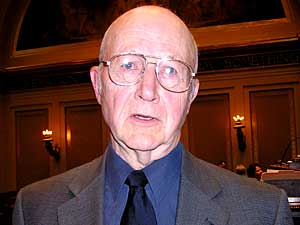Photos
More from MPR
Your Voice
| ||||||||||||||||||||||||||||||||||||||||||||||||||
Senate passes stricter DWI limit
February 12, 2004
The Minnesota Senate Thursday voted to lower the state's drunk driving limit. Minnesota is one of just three states in the country that does not have a drunk driving standard of .08 blood-alcohol content. The Legislature has debated the lower limit for years, and many observers think this year, it will finally become law.
St. Paul, Minn. — The .08 legislation has been gaining momentum at the Capitol in recent years, under pressure from the federal government. Minnesota stands to lose more than $6 million in federal highway funds this year if the state doesn't lower the drunk driving limit from .10 to .08.
The bill's sponsor, Sen. Leo Foley, DFL-Coon Rapids, says the loss of federal money persuaded many legislators to reverse their opposition to the bill.
"Money also talks, and the loss of those dollars was just insurmountable, I think," Foley says.
Gov. Pawlenty came out in support of .08 last fall, and his support has swayed some former opponents, including House Speaker Steve Sviggum. House Republican leaders had blocked the bill the last few years. Pawlenty says the lower limit would improve public safety and bring more federal money to the state.
|
Every state around us has passed 0.08. It's an embarrassment. Why would Minnesota want to be the last state to pass 0.08?
- Sen. Dave Knutson, R-Burnsville |
Sen. Foley, a former state trooper, says while the federal dollars are significant, the most important reason to pass .08 is that a lower drunk driving limit will save lives.
"There's approximately 14 people that die every year that could be saved by that legislation," Foley says.
The Senate passed Foley's bill by a vote of 48-18. Opponents say the bill is an unfunded mandate to local governments. Sen. David Tomassoni, DFL-Chisholm, says more drunk driving arrests will burden financially-strapped counties and lead to jail overcrowding. He says state agencies have estimated an additional 1,570 DWI arrests every year if the state enacts .08.
"And if you just take that and say it's going to cost you $10,000 per person to prosecute, you're going to come up with about, oh, $15 million per year," says Tomassoni. "That's more than the $66 million that we're getting from the federal highway funds."
Tomassoni says if the Legislature passes the lower limit, it should also come up with more money for counties. The last Legislature cut local government aid by about one-quarter.
Other opponents of .08 say Minnesota lawmakers shouldn't bow to pressure from the federal government. Sen. Steve Murphy, DFL-Red Wing, says he's a recovering alcoholic who doesn't want people to drive after even one drink. But Murphy said he can't vote for .08, because he says the Legislature has to stop placating Washington D.C.
"And I say enough is enough. Let's send them a clear message that the state of Minnesota is going to do what we feel is right for Minnesotans and Minnesotans' roads," says Murphy.
Supporters of the bill say the Legislature has stood in the way of .08 long enough. Delaware and Colorado are the only other states that haven't enacted the lower limit.
"Every state around us has passed 0.08," said Sen. Dave Knutson, R-Burnsville. "It's an embarrassment. Why would Minnesota want to be the last state to pass 0.08?"
The bill's House sponsor, Rep. Steve Strachan, R-Farmington, is a police sergeant. Strachan says he's arrested hundreds of drunk drivers, and thinks a lower limit will deter more people from drinking and driving.
"I know that it'll make a difference in terms of public perception - I shouldn't have that last beer," says Strachan. "I can also tell you as a police officer that .08 is intoxicated -- .08 is not a beer-and-a-half at Applebees, .08 is intoxicated, it's drunk."
Strachan says there will probably be attempts to delay .08 until 2007, but he thinks the legislation will be enacted this year.
|
News Headlines
|
Related Subjects
|


